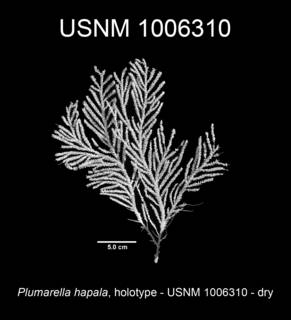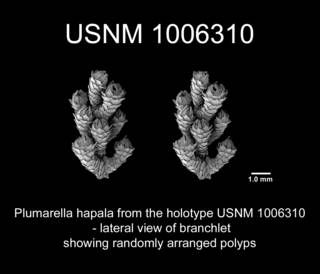WoRMS taxon details
Plumarella hapala Cairns, 2011
574235 (urn:lsid:marinespecies.org:taxname:574235)
accepted
Species
marine, brackish, fresh, terrestrial
Cairns, S.D. (2011). A Revision of the Primnoidae (Octocorallia: Alcyonacea) from the Aleutian Islands and Bering Sea. <em>Smithsonian Contributions to Zoology.</em> (634), 1-55., available online at https://doi.org/10.5479/si.00810282.634 [details] Available for editors  [request]
[request]
Type locality contained in Aleutian Islands
type locality contained in Aleutian Islands [details]
Etymology Named hapala (Latin for soft to the touch, delicate) because the thin body wall scales produce a relatively weak body wall,...
Etymology Named hapala (Latin for soft to the touch, delicate) because the thin body wall scales produce a relatively weak body wall, which is often crushed or collapsed during collection. [details]
McFadden, C.S.; Cordeiro, R.; Samimi-Namin, K.; Williams, G.; van Ofwegen, L. (2025). World List of Octocorallia. Plumarella hapala Cairns, 2011. Accessed through: World Register of Marine Species at: https://www.marinespecies.org/aphia.php?p=taxdetails&id=574235 on 2025-02-12
Date
action
by
![]() The webpage text is licensed under a Creative Commons
Attribution 4.0 License
The webpage text is licensed under a Creative Commons
Attribution 4.0 License
original description
Cairns, S.D. (2011). A Revision of the Primnoidae (Octocorallia: Alcyonacea) from the Aleutian Islands and Bering Sea. <em>Smithsonian Contributions to Zoology.</em> (634), 1-55., available online at https://doi.org/10.5479/si.00810282.634 [details] Available for editors  [request]
[request]
 Present
Present  Present in aphia/obis/gbif/idigbio
Present in aphia/obis/gbif/idigbio  Inaccurate
Inaccurate  Introduced: alien
Introduced: alien  Containing type locality
Containing type locality
From editor or global species database
Etymology Named hapala (Latin for soft to the touch, delicate) because the thin body wall scales produce a relatively weak body wall, which is often crushed or collapsed during collection. [details]


